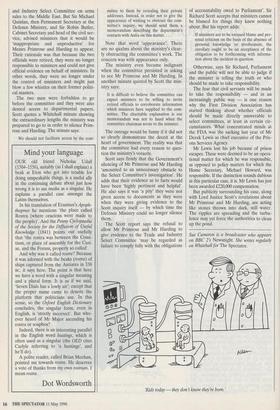Mind your language
OUR old friend Nicholas Udall (1504-1556), suitably (as I shall explain) a beak at Eton who got into trouble for doing unspeakable things, is a useful ally in the continuing debate about just how wrong it is to use media as a singular. He explains a parallel case amongst the Latins themselves.
In his translation of Erasmus's Apoph- thegmes he mentions 'the place called Rostra (where oracions were made to the people)'. And the Penny Cyclopaedia of the Society for the Diffusion of Useful Knowledge (1841) points out usefully that 'the rostra was between the Comi- tium, or place of assembly for the Curi- ae, and the Forum, properly so called'.
And why was it called rostra? Because it was adorned with the beaks (rostra) of ships captured from the Antiates in 338 BC, it says here. The point is that here we have a word with a singular meaning and a plural form. It is as if we said, `Seven Dials has a lowly air'; except that the proper name came to denote the platform that politicians use. In this sense, so the Oxford English Dictionary concludes, the singular form, even in English, is 'strictly incorrect'. But who- ever heard of Mr Major ascending his rostra or soapbox?
Indeed, there is an interesting parallel in the English word hustings, which is often used as a singular (the OED cites Carlyle referring to 'a hustings', and he'll do).
A polite reader, called Brian Meehan, pointed me towards rostra. He deserves a vote of thanks from my own rostrum, I mean rostra.
Dot Wordsworth


































































 Previous page
Previous page